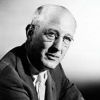Bruce Catton

Bruce Catton
Charles Bruce Cattonwas an American historian and journalist, best known for his books on the American Civil War. Known as a narrative historian, Catton specialized in popular history, featuring colorful characters and historical vignettes, in addition to the basic facts, dates, and analyses. Although his books were well researched and supported by footnotes, they were not generally presented in a rigorous academic style. He won a Pulitzer Prize in 1954 for A Stillness at Appomattox, his study of the final...
NationalityAmerican
ProfessionHistorian
Date of Birth9 October 1899
CityPetoskey, MI
CountryUnited States of America
The 1860 election became a referendum on the southern way of life.
Shiloh had as many casualties as Waterloo, and yet there were another 20 Waterloos to come.
Like most Rebel soldiers, Sam Watkins owned no slaves.
The Confederate Constitution was almost identical to that of the United States.
History does not usually make real sense until long afterward.
The enduring realization that when a great challenge comes, the most ordinary people can show that they value something more than they value their own lives. When the last of the veterans had gone, and the sorrows and bitterness which the war created had at last worn away, this memory remained.
I think I was always subconsciously driven by an attempt to restate that faith and to show where it was properly grounded, how it grew out of what a great many young men on both sides felt and believed and were brave enough to do
Early youth is a baffling time
Beneath everything else, North and West, there ran a profound, unvoiced, almost subconscious conviction that the [American] nation was going to go on growing-in size, in power, in everything a man could think of-and in that belief there was a might and a fury that would take form instantly at the moment of shock.
In this respect early youth is exactly like old age; it is a time of waiting for a big trip to an unknown destination. The chief difference is that youth waits for the morning limited and age waits for the night train
Soldiers who had been in the army long enough to know what a bloody swindle war really is would begin to feel that army life was really kind of fun, as long as [General Philip] Sheridan was up front.
The present moment is nice but it does not last. Living in it is like waiting in a junction town for the morning limited; the junction may be interesting but some day you will have to leave it and you do not know where the limited will take you.
Here was the greatest and most moving chapter in American history, a blending of meanness and greatness, an ending and a beginning. It came out of what men were, but it did not go as men had planned.
Our American heritage is greater than any one of us. It can express itself in very homely truths; in the end it can lift up our eyes beyond the glow in the sunset skies.